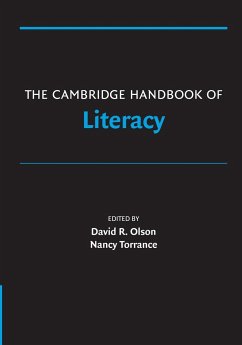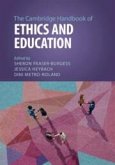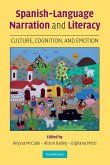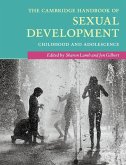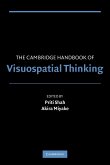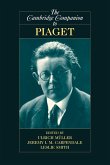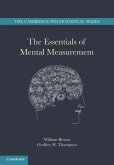The Cambridge Handbook of Literacy
Herausgeber: Olson, David R.; Torrance, Nancy
The Cambridge Handbook of Literacy
Herausgeber: Olson, David R.; Torrance, Nancy
- Broschiertes Buch
- Merkliste
- Auf die Merkliste
- Bewerten Bewerten
- Teilen
- Produkt teilen
- Produkterinnerung
- Produkterinnerung
Everything that is involved in being and becoming literate is the concern of this interdisciplinary group of distinguished scholars.
Andere Kunden interessierten sich auch für
![The Cambridge Handbook of Ethics and Education The Cambridge Handbook of Ethics and Education]() The Cambridge Handbook of Ethics and Education95,99 €
The Cambridge Handbook of Ethics and Education95,99 €![Spanish-Language Narration and Literacy Spanish-Language Narration and Literacy]() Spanish-Language Narration and Literacy34,99 €
Spanish-Language Narration and Literacy34,99 €![The Cambridge Handbook of Sexual Development The Cambridge Handbook of Sexual Development]() The Cambridge Handbook of Sexual Development62,99 €
The Cambridge Handbook of Sexual Development62,99 €![The Cambridge Handbook of Visuospatial Thinking The Cambridge Handbook of Visuospatial Thinking]() Priti Shah / Akira Miyake (eds.)The Cambridge Handbook of Visuospatial Thinking62,99 €
Priti Shah / Akira Miyake (eds.)The Cambridge Handbook of Visuospatial Thinking62,99 €![The Cambridge Handbook of Prosociality The Cambridge Handbook of Prosociality]() The Cambridge Handbook of Prosociality63,99 €
The Cambridge Handbook of Prosociality63,99 €![The Cambridge Companion to Piaget The Cambridge Companion to Piaget]() The Cambridge Companion to Piaget43,99 €
The Cambridge Companion to Piaget43,99 €![The Essentials of Mental Measurement The Essentials of Mental Measurement]() William BrownThe Essentials of Mental Measurement40,99 €
William BrownThe Essentials of Mental Measurement40,99 €-
-
-
Everything that is involved in being and becoming literate is the concern of this interdisciplinary group of distinguished scholars.
Hinweis: Dieser Artikel kann nur an eine deutsche Lieferadresse ausgeliefert werden.
Hinweis: Dieser Artikel kann nur an eine deutsche Lieferadresse ausgeliefert werden.
Produktdetails
- Produktdetails
- Verlag: Cambridge University Press
- Seitenzahl: 624
- Erscheinungstermin: 13. März 2014
- Englisch
- Abmessung: 254mm x 178mm x 33mm
- Gewicht: 1156g
- ISBN-13: 9780521680523
- ISBN-10: 0521680522
- Artikelnr.: 26106433
- Herstellerkennzeichnung
- Libri GmbH
- Europaallee 1
- 36244 Bad Hersfeld
- gpsr@libri.de
- Verlag: Cambridge University Press
- Seitenzahl: 624
- Erscheinungstermin: 13. März 2014
- Englisch
- Abmessung: 254mm x 178mm x 33mm
- Gewicht: 1156g
- ISBN-13: 9780521680523
- ISBN-10: 0521680522
- Artikelnr.: 26106433
- Herstellerkennzeichnung
- Libri GmbH
- Europaallee 1
- 36244 Bad Hersfeld
- gpsr@libri.de
Part I. Literacy as a Scientific Subject: 1. The literacy episteme (from
Innis to Derrida) Jens Brockmeier and David Olson; Part II. Literacy and
Language: 2. Grammotology Peter T. Daniels; 3. Speech and writing Roy
Harris; 4. The origins and co-evolution of literacy and numeracy Steven
Chrisomalis; 5. Are there linguistic consequences of literacy? Comparing
the potentials of language use in speech and writing Douglas Biber; 6.
Becoming a literate language user: oral and written text construction
across adolescence Ruth A. Berman and Dorit Ravid; 7. The challenge of
academic language Catherine Snow and Paola Uccelli; 8. The basic processes
in reading: insights from neuroscience Usha Goswami; 9. Language and
literacy from a cognitive neuroscience perspective Karl Magnus Petersson,
Martin Ingvaar, and Alexandra Reis; Part III. Literacy and Literatures: 10.
Ways of reading Elizabeth Long; 11. Conventions of reading Heather Murray;
12. Literacy, reading and concepts of the self Carolyn Steedman; 13.
Reading as a woman, being read as a woman Lisbeth Larsson; 14. Literacy and
the history of science Karine Chemla; 15. Scientific literacy Steven Norris
and Linda Phillips; 16. Digital literacy Teresa Dobson and John Willinsky;
17. Literacy, video games and popular culture James Paul Gee; Part IV.
Literacy and Society: 18. Ethnography of writing and reading Brian Street;
19. The origins of Western literacy: literacy in Ancient Greece and Rome
Rosalind Thomas; 20. Literacy from late antiquity to the early Middle Ages,
c. 300-800 Nicholas Everett; 21. Chinese literacy Feng Wang, Yaching Tsai
and William Shi-Yuan Wang; 22. The elephant in the room: language and
literacy in the Arab world Niloofar Haeri; 23. Literacy, modernization, the
intellectual community and civil society in the western world Frits van
Holthoon; Part V. Literacy and Education: 24. The teaching of literacy
skills in Western Europe: an historical perspective (16th to 20th
centuries) A.-M. Chartier; 25. The configuration of literacy as a domain of
knowledge Liliana Tolchinsky; 26. Literate thinking: metalinguistics and
metacognition Bruce Homer; 27. Cultural and developmental predispositions
to literacy Alison Garton and Chris Pratt; 28. Literacy and international
development: education and literacy as human rights Joe Farrell; 29. Adult
literacy education in industrialized nations Tom Sticht; 30. New
technologies for literacy and international development Daniel Wagner; 31.
Literacy theory and literacy policy David Olson.
Innis to Derrida) Jens Brockmeier and David Olson; Part II. Literacy and
Language: 2. Grammotology Peter T. Daniels; 3. Speech and writing Roy
Harris; 4. The origins and co-evolution of literacy and numeracy Steven
Chrisomalis; 5. Are there linguistic consequences of literacy? Comparing
the potentials of language use in speech and writing Douglas Biber; 6.
Becoming a literate language user: oral and written text construction
across adolescence Ruth A. Berman and Dorit Ravid; 7. The challenge of
academic language Catherine Snow and Paola Uccelli; 8. The basic processes
in reading: insights from neuroscience Usha Goswami; 9. Language and
literacy from a cognitive neuroscience perspective Karl Magnus Petersson,
Martin Ingvaar, and Alexandra Reis; Part III. Literacy and Literatures: 10.
Ways of reading Elizabeth Long; 11. Conventions of reading Heather Murray;
12. Literacy, reading and concepts of the self Carolyn Steedman; 13.
Reading as a woman, being read as a woman Lisbeth Larsson; 14. Literacy and
the history of science Karine Chemla; 15. Scientific literacy Steven Norris
and Linda Phillips; 16. Digital literacy Teresa Dobson and John Willinsky;
17. Literacy, video games and popular culture James Paul Gee; Part IV.
Literacy and Society: 18. Ethnography of writing and reading Brian Street;
19. The origins of Western literacy: literacy in Ancient Greece and Rome
Rosalind Thomas; 20. Literacy from late antiquity to the early Middle Ages,
c. 300-800 Nicholas Everett; 21. Chinese literacy Feng Wang, Yaching Tsai
and William Shi-Yuan Wang; 22. The elephant in the room: language and
literacy in the Arab world Niloofar Haeri; 23. Literacy, modernization, the
intellectual community and civil society in the western world Frits van
Holthoon; Part V. Literacy and Education: 24. The teaching of literacy
skills in Western Europe: an historical perspective (16th to 20th
centuries) A.-M. Chartier; 25. The configuration of literacy as a domain of
knowledge Liliana Tolchinsky; 26. Literate thinking: metalinguistics and
metacognition Bruce Homer; 27. Cultural and developmental predispositions
to literacy Alison Garton and Chris Pratt; 28. Literacy and international
development: education and literacy as human rights Joe Farrell; 29. Adult
literacy education in industrialized nations Tom Sticht; 30. New
technologies for literacy and international development Daniel Wagner; 31.
Literacy theory and literacy policy David Olson.
Part I. Literacy as a Scientific Subject: 1. The literacy episteme (from
Innis to Derrida) Jens Brockmeier and David Olson; Part II. Literacy and
Language: 2. Grammotology Peter T. Daniels; 3. Speech and writing Roy
Harris; 4. The origins and co-evolution of literacy and numeracy Steven
Chrisomalis; 5. Are there linguistic consequences of literacy? Comparing
the potentials of language use in speech and writing Douglas Biber; 6.
Becoming a literate language user: oral and written text construction
across adolescence Ruth A. Berman and Dorit Ravid; 7. The challenge of
academic language Catherine Snow and Paola Uccelli; 8. The basic processes
in reading: insights from neuroscience Usha Goswami; 9. Language and
literacy from a cognitive neuroscience perspective Karl Magnus Petersson,
Martin Ingvaar, and Alexandra Reis; Part III. Literacy and Literatures: 10.
Ways of reading Elizabeth Long; 11. Conventions of reading Heather Murray;
12. Literacy, reading and concepts of the self Carolyn Steedman; 13.
Reading as a woman, being read as a woman Lisbeth Larsson; 14. Literacy and
the history of science Karine Chemla; 15. Scientific literacy Steven Norris
and Linda Phillips; 16. Digital literacy Teresa Dobson and John Willinsky;
17. Literacy, video games and popular culture James Paul Gee; Part IV.
Literacy and Society: 18. Ethnography of writing and reading Brian Street;
19. The origins of Western literacy: literacy in Ancient Greece and Rome
Rosalind Thomas; 20. Literacy from late antiquity to the early Middle Ages,
c. 300-800 Nicholas Everett; 21. Chinese literacy Feng Wang, Yaching Tsai
and William Shi-Yuan Wang; 22. The elephant in the room: language and
literacy in the Arab world Niloofar Haeri; 23. Literacy, modernization, the
intellectual community and civil society in the western world Frits van
Holthoon; Part V. Literacy and Education: 24. The teaching of literacy
skills in Western Europe: an historical perspective (16th to 20th
centuries) A.-M. Chartier; 25. The configuration of literacy as a domain of
knowledge Liliana Tolchinsky; 26. Literate thinking: metalinguistics and
metacognition Bruce Homer; 27. Cultural and developmental predispositions
to literacy Alison Garton and Chris Pratt; 28. Literacy and international
development: education and literacy as human rights Joe Farrell; 29. Adult
literacy education in industrialized nations Tom Sticht; 30. New
technologies for literacy and international development Daniel Wagner; 31.
Literacy theory and literacy policy David Olson.
Innis to Derrida) Jens Brockmeier and David Olson; Part II. Literacy and
Language: 2. Grammotology Peter T. Daniels; 3. Speech and writing Roy
Harris; 4. The origins and co-evolution of literacy and numeracy Steven
Chrisomalis; 5. Are there linguistic consequences of literacy? Comparing
the potentials of language use in speech and writing Douglas Biber; 6.
Becoming a literate language user: oral and written text construction
across adolescence Ruth A. Berman and Dorit Ravid; 7. The challenge of
academic language Catherine Snow and Paola Uccelli; 8. The basic processes
in reading: insights from neuroscience Usha Goswami; 9. Language and
literacy from a cognitive neuroscience perspective Karl Magnus Petersson,
Martin Ingvaar, and Alexandra Reis; Part III. Literacy and Literatures: 10.
Ways of reading Elizabeth Long; 11. Conventions of reading Heather Murray;
12. Literacy, reading and concepts of the self Carolyn Steedman; 13.
Reading as a woman, being read as a woman Lisbeth Larsson; 14. Literacy and
the history of science Karine Chemla; 15. Scientific literacy Steven Norris
and Linda Phillips; 16. Digital literacy Teresa Dobson and John Willinsky;
17. Literacy, video games and popular culture James Paul Gee; Part IV.
Literacy and Society: 18. Ethnography of writing and reading Brian Street;
19. The origins of Western literacy: literacy in Ancient Greece and Rome
Rosalind Thomas; 20. Literacy from late antiquity to the early Middle Ages,
c. 300-800 Nicholas Everett; 21. Chinese literacy Feng Wang, Yaching Tsai
and William Shi-Yuan Wang; 22. The elephant in the room: language and
literacy in the Arab world Niloofar Haeri; 23. Literacy, modernization, the
intellectual community and civil society in the western world Frits van
Holthoon; Part V. Literacy and Education: 24. The teaching of literacy
skills in Western Europe: an historical perspective (16th to 20th
centuries) A.-M. Chartier; 25. The configuration of literacy as a domain of
knowledge Liliana Tolchinsky; 26. Literate thinking: metalinguistics and
metacognition Bruce Homer; 27. Cultural and developmental predispositions
to literacy Alison Garton and Chris Pratt; 28. Literacy and international
development: education and literacy as human rights Joe Farrell; 29. Adult
literacy education in industrialized nations Tom Sticht; 30. New
technologies for literacy and international development Daniel Wagner; 31.
Literacy theory and literacy policy David Olson.

